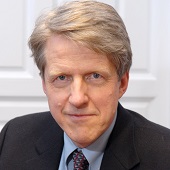Financial Capitalism: A Safe Venue for Power Struggles Without Violence
Who still remembers that, before the advent of modern financial capitalism, power was wielded in much starker ways?
May 31, 2012
To make the financial system work well, we have to make a leap of faith that is not easy to make, especially in light of the recent profound failures in the world of finance. We need to further develop the inherent logic of finance, its own ways of making deals among ultimately independent and free people — deals that leave them all better off.
The democratization of finance calls for an improvement in the nature and extent of participation in the financial system, including awareness of fundamental information about the workings of the system. The public needs to have reliable information, and that can only be provided by advisers, legal representatives and educators who see their role as one of promoting enlightened stewardship.
When people can benefit from such help, they will come to feel less strongly that our economy is run by a power elite. At present, most people have little or no such information. Instead, they are routinely confronted by salespeople for financial products, who have inadequate incentives to tell them what they really need to know. But it could be different, under a truly enlightened system of financial capitalism.
To make that a reality, some government interventions are needed, including redistributions through a progressive income tax. This could be done more deliberately and judiciously than it is at present, without raising alarms that wealth might be unfairly confiscated.
The need for a safety net
Current economic realities are such that it is hard for anyone to escape the realization that there needs to be a social safety net, and that this safety net has to be continually improved and reworked.
At the same time, we need to recognize that, under financial capitalism, many of our best protections, and inspirations, come not directly from the government, but from our own private financial arrangements. The government can merely be a facilitator.
The democratization of finance works hand-in-hand with the humanization of finance. To that extent, it is important that finance be humane, and that it incorporate our increasingly sophisticated understanding of the human mind into its systems, models and predictions.
The rise of behavioral economics and neuro-economics in recent decades provides a foundation for such an approach, for understanding how people really think and act. People are not inherently and uniformly loving to their neighbors, but our institutions can be changed to reward the better side of human nature.
Hostage exchange
The rules that regulate financial institutions are like the rules of war. They lessen the unnecessary damage from human aggression and they work to encourage the expression of other, more charitable, human impulses.
Before modern financial capitalism, however, power was wielded in much starker ways. For example, throughout most of human history, hostage exchanges were used to guarantee agreements between governments.
A king might be forced to give up his son to spend years in the land of a rival leader, with the understanding that the son would be killed if the king did not live up to a treaty or other bargain. Because of the outrageous inhumanity of such a practice, it is now eschewed by respectable governments the world over.
But modern finance has not done away with all forms of hostage exchanges to seal deals. The term for the modern-day hostage exchange is collateral, and the hostages are financial assets instead of people. The practice was elevated to a high level before the severe financial crisis that began in 2007, with the widespread use of repurchase agreements (repos) to carry financing farther forward.
Even the home mortgage is, in essence, a medieval-style hostage exchange, one in which the home (and the sense of equilibrium and well-being it provides to its inhabitants) is the hostage.
Building a safe venue
Ultimately, a well-constituted financial capitalism creates a safe venue for power struggles without violence. Achieving such a system requires appropriate innovations that humanize finance (including taking account of our increasing knowledge from behavioral economics and neuro-economics). There is no known economic system that can perfect aggressive human impulses — but they can be softened.
The key to enhancing human values is to maintain and continually improve a democratic financial system that takes account of the diversity of human motives and drives. We need a system that allows people to make complex and incentivizing deals to further their goals.
And it must be one that allows an outlet for our aggressions and lust for power. It must also be a system that redirects the inevitable human conflicts into a manageable arena, an arena that is both peaceful and constructive.
Editor’s note: This article is an edited version of a section from Finance and the Good Society by Robert J. Shiller. Published by arrangement with Princeton University Press. Copyright © 2012 by Princeton University Press.
Takeaways
Most people are routinely confronted by salespeople for financial products and can’t evaluate offers independently.
Those who sell financial products to consumers have little incentive to tell them what they really need to know.
The home mortgage is, in essence, a medieval-style hostage exchange, one in which the home is the hostage.
There is no known economic system that can end aggressive human impulses, but they can be softened.
A financial system must redirect human conflict into a manageable arena that is both peaceful and constructive.
Read previous
The State of Finance: An Interim Assessment
May 30, 2012
